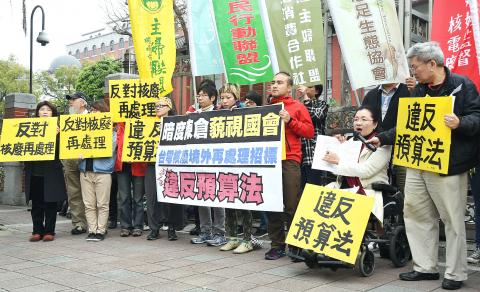A coalition of environmental protection groups yesterday rallied in front of the legislature to protest Taiwan Power Co’s (Taipower) holding of an international bid to reprocess 1,200 bundles of highly radioactive nuclear fuel rods overseas, saying the move has violated administrative procedures and could encourage the proliferation of nuclear weapons.
On the day before Lunar New Year’s Eve, Taipower issued a call for bids to deliver 480 and 720 bundles of spent fuel rods from the Jinshan Nuclear Power Plant in New Taipei City’s Shihmen District (石門) and the Guosheng Nuclear Power Plant in New Taipei City’s Wanli District (萬里) overseas for reprocessing. The state-run utility has budgeted NT$11.25 billion (US$356.4 million) despite having only an earmarked budget of NT$1.69 billion for the current fiscal year, which is still pending review by legislators.
Environmental activists have said that it is almost certain that French-based nuclear waste reprocessing company Areva will undertake the task.

Photo: Liu Hsin-de, Taipei Times
Green Citizen Action Alliance deputy secretary-general Hung Shen-han (洪申翰) said that reprocessing nuclear waste is actually a means to extend the service life of the Jinshan and Guosheng plants, because the spent fuel pools at the facilities are nearing capacity and the New Taipei City Government will not approve Taipower’s request to set up dry storage casks outside the Jinshan plant amid concern over earthquakes and floods.
He said that nuclear waste reprocessing is aimed at recycling and reusing fissile materials — which are resold to international companies and governments — and that highly radioactive remnants of the reprocessed fissile materials will be sent back to Taiwan when the contract expires.
By then, Taiwan will still face the challenge of identifying a geologically stable site to store the nuclear waste.
Alliance researcher Hsu Shih-ya (徐詩雅) decried Taipower’s arbitrarily offering a sum much higher than the budget it asked for.
Accepting tenders for the plan violates the Budget Act (預算法), and Taipower will have to pay hefty damages — using taxpayers’ money — if the contract it inks with the project contractor is eventually revoked, Hsu said..
She said nuclear waste reprocessing is a controversial and sensitive issue, and the international community has veered away from nuclear waste reprocessing because of its steep cost and impact on the environment and public health.
Above all, the uranium and plutonium extracted during the process will likely be resold to nuclear weapons manufacturers, which will exacerbate the problem of nuclear arms proliferation, she said.
Hsu said the project proposed by Taipower would continue into 2038, but the contract discussed in the call for bids only has a 10-year validity, after which the nation will have to pay additional fees if it wants to entrust the fissile materials to the project contractor or have it resold.
Democratic Progressive Party (DPP) Legislator Tien Chiu-chin (田秋堇) said that Taipower tried to slip in information about the plan in its budget proposal this year by including it in the same package as existing plans on nuclear waste disposal.
She accused the firm of lying by saying that the call for bids is part of an ongoing plan, adding that Taipower’s acceptance of tenders is both illegal and disrespectful to the legislature.
She demanded that Taipower immediately withdraw its online call for tenders and explain to the public the ambiguous terms set forth in its contract, as well as release details of its negotiations with potential contractors and charges for overseas nuclear waste maintenance before 2038 in the upcoming legislative session.

An essay competition jointly organized by a local writing society and a publisher affiliated with the Chinese Communist Party (CCP) might have contravened the Act Governing Relations Between the People of the Taiwan Area and the Mainland Area (臺灣地區與大陸地區人民關係條例), the Mainland Affairs Council (MAC) said on Thursday. “In this case, the partner organization is clearly an agency under the CCP’s Fujian Provincial Committee,” MAC Deputy Minister and spokesperson Liang Wen-chieh (梁文傑) said at a news briefing in Taipei. “It also involves bringing Taiwanese students to China with all-expenses-paid arrangements to attend award ceremonies and camps,” Liang said. Those two “characteristics” are typically sufficient

A magnitude 5.9 earthquake that struck about 33km off the coast of Hualien City was the "main shock" in a series of quakes in the area, with aftershocks expected over the next three days, the Central Weather Administration (CWA) said yesterday. Prior to the magnitude 5.9 quake shaking most of Taiwan at 6:53pm yesterday, six other earthquakes stronger than a magnitude of 4, starting with a magnitude 5.5 quake at 6:09pm, occurred in the area. CWA Seismological Center Director Wu Chien-fu (吳健富) confirmed that the quakes were all part of the same series and that the magnitude 5.5 temblor was

The brilliant blue waters, thick foliage and bucolic atmosphere on this seemingly idyllic archipelago deep in the Pacific Ocean belie the key role it now plays in a titanic geopolitical struggle. Palau is again on the front line as China, and the US and its allies prepare their forces in an intensifying contest for control over the Asia-Pacific region. The democratic nation of just 17,000 people hosts US-controlled airstrips and soon-to-be-completed radar installations that the US military describes as “critical” to monitoring vast swathes of water and airspace. It is also a key piece of the second island chain, a string of

The Central Weather Administration has issued a heat alert for southeastern Taiwan, warning of temperatures as high as 36°C today, while alerting some coastal areas of strong winds later in the day. Kaohsiung’s Neimen District (內門) and Pingtung County’s Neipu Township (內埔) are under an orange heat alert, which warns of temperatures as high as 36°C for three consecutive days, the CWA said, citing southwest winds. The heat would also extend to Tainan’s Nansi (楠西) and Yujing (玉井) districts, as well as Pingtung’s Gaoshu (高樹), Yanpu (鹽埔) and Majia (瑪家) townships, it said, forecasting highs of up to 36°C in those areas